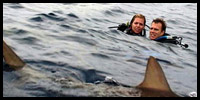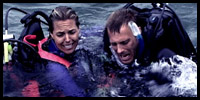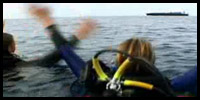
 |
|
Open Water (2004) Cast: Blanchard Ryan, Daniel Travis, Saul Stein, Estelle Lau, Michael E. Williamson, Cristina Zenarro, John Charles 2004 – 79 minutes Rated: Reviewed by Dustin Putman, July 24, 2004.  "Open Water" was prematurely hailed as the next "Blair Witch Project" at this year's Sundance Film Festival, where such a lofty title likely sprouted more out of a desire to find another micro-budgeted success story than because this one actually deserved it. Written and directed by Chris Kentis, the film features a chilling premise—loosely based on a true story—and amazingly authentic production values. For a $30,000 motion picture, the logistics of shooting almost completely in the middle of the ocean for hours on end must have been daunting, but the extra trouble pays off with footage that seems genuinely stark and real. But, alas, "Open Water" doesn't come close to approaching the unshakably frightening, skin-crawling heights of "The Blair Witch Project." It is a thriller not easily forgotten, yes, but the filmmaking isn't nearly as air-tight and assured, and the screenplay isn't up to the challenge of meeting its existential demands.
"Open Water" was prematurely hailed as the next "Blair Witch Project" at this year's Sundance Film Festival, where such a lofty title likely sprouted more out of a desire to find another micro-budgeted success story than because this one actually deserved it. Written and directed by Chris Kentis, the film features a chilling premise—loosely based on a true story—and amazingly authentic production values. For a $30,000 motion picture, the logistics of shooting almost completely in the middle of the ocean for hours on end must have been daunting, but the extra trouble pays off with footage that seems genuinely stark and real. But, alas, "Open Water" doesn't come close to approaching the unshakably frightening, skin-crawling heights of "The Blair Witch Project." It is a thriller not easily forgotten, yes, but the filmmaking isn't nearly as air-tight and assured, and the screenplay isn't up to the challenge of meeting its existential demands.
 Susan (Blanchard Ryan) and Daniel (Daniel Travis) are a typically well-off, overworked yuppie couple who decide to get away from their responsibilities by taking a Caribbean-style vacation. While out on a scuba diving expedition, the two return to the surface of the water to find the boat with the other travelers gone—the result of a head-count mix-up. At first, Susan and Daniel remain logical and optimistic, believing the boat will return all in good time. As the hours press on and night finally arrives, however, they are faced with the horrifying, life-threatening fact that they are stranded alone in the middle of the ocean. It is only a matter of time before one of the sharks swimming below them gets hungry.
Susan (Blanchard Ryan) and Daniel (Daniel Travis) are a typically well-off, overworked yuppie couple who decide to get away from their responsibilities by taking a Caribbean-style vacation. While out on a scuba diving expedition, the two return to the surface of the water to find the boat with the other travelers gone—the result of a head-count mix-up. At first, Susan and Daniel remain logical and optimistic, believing the boat will return all in good time. As the hours press on and night finally arrives, however, they are faced with the horrifying, life-threatening fact that they are stranded alone in the middle of the ocean. It is only a matter of time before one of the sharks swimming below them gets hungry.
 "Open Water" builds, slowly but surely, as it sets up its scary situation and then must deal with the consequences of two people, out of pure bad luck, faced with the unthinkable. Writer-director Chris Kentis pulls the viewer into his web by developing his protagonist couple into two identifiable, sympathetic people before the central conflict occurs. Once it does, he keeps them there by orchestrating a number of sequences of unpredictable, jolting intensity, not only from the real-life sharks used but through the couple's alternately heated, fearful, and affectionate interactions. Aiding in the raw emotions on hand is the digital video photography, grainy enough to garner further truth out of its subject but polished enough to capture some astonishing images of the sea at different times of day. For most of the running time, one suspects that the way Susan and Daniel behave through the course of their ordeal, jumping from one stage of grief to the next, is precisely how two human beings would act. It is this provocative characteristic that raises the film above the level of a mediocre, exploitive shocker.
"Open Water" builds, slowly but surely, as it sets up its scary situation and then must deal with the consequences of two people, out of pure bad luck, faced with the unthinkable. Writer-director Chris Kentis pulls the viewer into his web by developing his protagonist couple into two identifiable, sympathetic people before the central conflict occurs. Once it does, he keeps them there by orchestrating a number of sequences of unpredictable, jolting intensity, not only from the real-life sharks used but through the couple's alternately heated, fearful, and affectionate interactions. Aiding in the raw emotions on hand is the digital video photography, grainy enough to garner further truth out of its subject but polished enough to capture some astonishing images of the sea at different times of day. For most of the running time, one suspects that the way Susan and Daniel behave through the course of their ordeal, jumping from one stage of grief to the next, is precisely how two human beings would act. It is this provocative characteristic that raises the film above the level of a mediocre, exploitive shocker.
 Had Kentis (also the editor and cinematographer, to boot) remained steadfast with Susan and Daniel from start to finish, refusing to cut away from their plight, "Open Water" might have been uncountably better. Instead, he returns to land on several occasions, usually at inopportune times that take the viewer out of unnerving moments, for no better reason than to show how life goes on, and modern people take for granted their touchy relationship with nature. The problem with this is that the very same theme could be pulled from the scenes involving Susan and Daniel; everything not involving them is extraneous. Furthermore, although the film plucks stinging anxiety out of the viewer in several scenes, none more than during the terrifying nighttime sequence, lit only by the sporadic lightning in the sky, these moments of deep unrest are too briefly edited to retain full impact. Director Kentis does this often, pulling out of potentially suspense-drenched scenes before they have naturally reached their climax.
Had Kentis (also the editor and cinematographer, to boot) remained steadfast with Susan and Daniel from start to finish, refusing to cut away from their plight, "Open Water" might have been uncountably better. Instead, he returns to land on several occasions, usually at inopportune times that take the viewer out of unnerving moments, for no better reason than to show how life goes on, and modern people take for granted their touchy relationship with nature. The problem with this is that the very same theme could be pulled from the scenes involving Susan and Daniel; everything not involving them is extraneous. Furthermore, although the film plucks stinging anxiety out of the viewer in several scenes, none more than during the terrifying nighttime sequence, lit only by the sporadic lightning in the sky, these moments of deep unrest are too briefly edited to retain full impact. Director Kentis does this often, pulling out of potentially suspense-drenched scenes before they have naturally reached their climax.
 Imperative to much of the picture's believability are relative newcomers Blanchard Ryan (2002's "Super Troopers") and Daniel Travis, as Susan and Daniel. They act and feel like a real couple whose relationship is solid but whose sexual intimacy has recently faltered. Ryan and Travis avoid overacting histrionics as they face their situation in an honest way, angry with each other out of frustration but still holding on to the love they have for one another. They command the screen for roughly an hour, doing no more than floating atop the water, and make their exchanges, even the most insignificant, compelling to watch. Had more time been spent with them in the third act, developing their rising despair and deepening their connection and pasts, then the finale might have held more weight than it does.
Imperative to much of the picture's believability are relative newcomers Blanchard Ryan (2002's "Super Troopers") and Daniel Travis, as Susan and Daniel. They act and feel like a real couple whose relationship is solid but whose sexual intimacy has recently faltered. Ryan and Travis avoid overacting histrionics as they face their situation in an honest way, angry with each other out of frustration but still holding on to the love they have for one another. They command the screen for roughly an hour, doing no more than floating atop the water, and make their exchanges, even the most insignificant, compelling to watch. Had more time been spent with them in the third act, developing their rising despair and deepening their connection and pasts, then the finale might have held more weight than it does.
 With the ending of "Open Water" comes contradictory feelings. On the one hand, the film—squarely placed within the horror genre without a single graphically violent moment—upholds its dignity by garnering palpable chills without wavering from narrative subtlety. The movie is technically ingenious and mostly well-made. Several shots from above, as the shapes of the sharks move ominously below the characters, are masterfully affecting while staying simple. On the opposite hand, the whole of "Open Water" leaves you feeling marginally underwhelmed. The storytelling could have tightened its focus, the length of some key scenes are too hurried, and the ending feels like a cheat because it hasn't taken its time to earn such grim irony. The action of one particular character should have been extensively rethought, or filmed in a more established way. "Open Water" is too inherently flawed to be compared to "The Blair Witch Project." Taken on its own accord, though, it is a jittery, unapologetic experience worth a look for those who prefer psychological horror over broad slasher cliches. Audience expectations would do well to remain reasonably mild.
With the ending of "Open Water" comes contradictory feelings. On the one hand, the film—squarely placed within the horror genre without a single graphically violent moment—upholds its dignity by garnering palpable chills without wavering from narrative subtlety. The movie is technically ingenious and mostly well-made. Several shots from above, as the shapes of the sharks move ominously below the characters, are masterfully affecting while staying simple. On the opposite hand, the whole of "Open Water" leaves you feeling marginally underwhelmed. The storytelling could have tightened its focus, the length of some key scenes are too hurried, and the ending feels like a cheat because it hasn't taken its time to earn such grim irony. The action of one particular character should have been extensively rethought, or filmed in a more established way. "Open Water" is too inherently flawed to be compared to "The Blair Witch Project." Taken on its own accord, though, it is a jittery, unapologetic experience worth a look for those who prefer psychological horror over broad slasher cliches. Audience expectations would do well to remain reasonably mild.
|
© 2004 by Dustin Putman |














